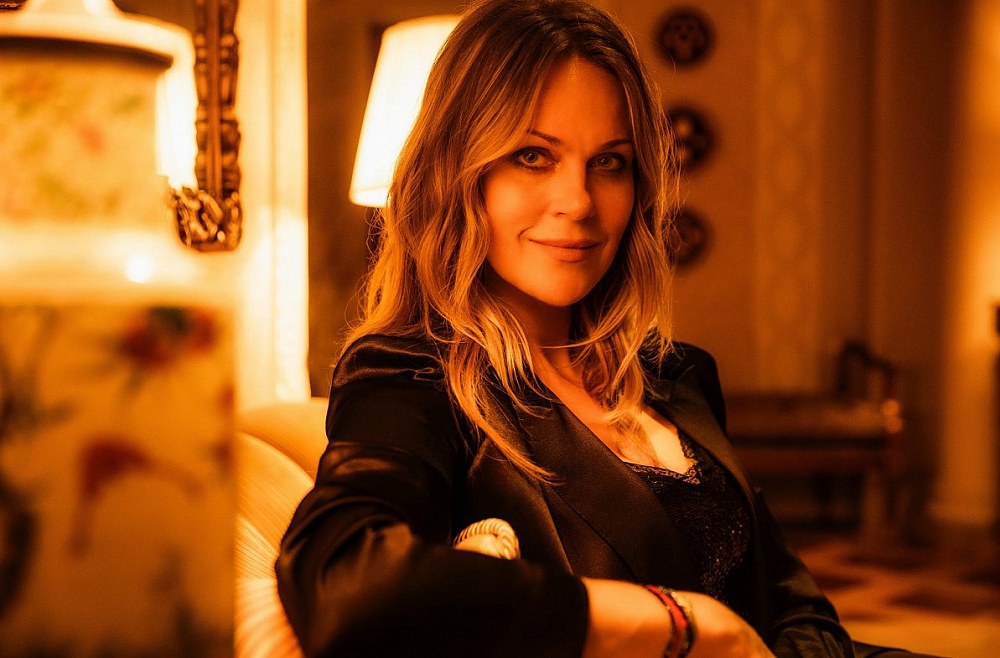January 18 Theater an der Wien Giacomo Puccini’s opera “Tosca”, directed by Martin Kushey, will premiere in Vienna with Christine Opolais. This role for her is like Ariadne’s thread, which runs through her entire career – she is sung in Riga, Berlin, Baden-Baden, Vienna, London, Athens, Graz, etc. .
What is it that binds you to this role?
This production of “Tosca” is an interesting story, because I decided that I didn’t want to sing “Tosca” anymore, because there was really no satisfaction in recent years, portraying something repeatedly. I had some questions and several times the image did not match my feelings. Of course, once the role has been sung several times, you have to find something interesting for the artist. I started reading and thinking between lines of music – this music requires something different from the stage and the acting. In recent productions, it was no longer interesting for me as an artist to do so. Singing, of course, is a whole other thing – it’s a separate story for me.
Puccini is still my favorite composer, but I decided to postpone the role for three or four years, but I soon received a call from Martin Kuchay.
Before the first wave of Covid-19 I sang Madame Butterfly At the Vienna State Opera. Martin currently lives in Vienna. He asked me to meet, talk, have tea so he could ask me something. But he slyly says, “Before I ask you anything, you have to say yes.” I thought – bad news (laughs), but I said – good, good, let’s meet and say. Then he offered this “Tuscany.” It was a surprise to me, because when I think of Martin Kushey, I imagine such a romantic, beautiful, passionate opera production. Martin probably wanted to ruin it, to say the least.
He is a provocateur.
A great provocateur, so I was very surprised, but it immediately intrigued me. I said that I had decided not to sing “Tosca” at all for a couple of years, but if he offers it, then there is a lot of interest, passion and curiosity about what will be there. I was wondering if his musical instincts would match what I feel about this story. I was very surprised that 70% of the view matched how I felt. It is very interesting for me to work now. Of course, a lot of violence, some views are ugly, so I immediately advise not to bring children. This will not be a romantic “Tosca”, you have to prepare for it.
How did he put Nara in the water and put on high-heeled shoes, but what does he mean to you as Tuscany?
Everything happens in winter – it is a very beautiful stage, because there is snow everywhere. Of course, the snow sometimes falls into the mouth, then sometimes there are problems with singing. There have been all sorts of curiosities, but they are also dangerous because there is a lot of snow. Martins and Martins. There is, of course, a lot of blood in his productions.
How is the duration of an opera defined?
It’s like with almost any of his productions – no time. It’s on a fantasy level. Everyone figures out which time, which place. I have a feeling that this is happening somewhere in Russia, in Siberia, after a war or an apocalypse, where people are surviving as best they can. Artists survive thanks to their talent – one in the sign, the other sings, I – as an actress and dancer. There’s something I really like and what I feel about music – Scarpia and Tuscany are known even before she met Kavaradosi. There’s a love story, there’s passion. Another thing was that Scarpia had never gained power over the soul of Tuscany. What he sees in the relationship between Floría Tosk and Mario Kavaradosi is what he would have liked. Especially in our production, he is cruel, and so it is in the libretto. Of course, in today’s world, it can be built acting, and we will see that in this production. He has a very thing in power. Of course, Tosca survives as a singer and also Kavaradosi sings and draws. In that ugly situation, artists survive, as they always have, and each leader had favorite singers, artists, dancers that they have supported. In this case, Tosca is a favorite dancer, singer.
Does that mean you’ll have to dance too?
I really don’t want to. That’s enough for me to do. It’s dramatically quite complicated, and it’s getting harder and harder for me to get out of all that drama. Of course I like to play. If it were a movie, it would be even cooler. She is basically a singer, but she also has to dance and do everything during her survival. It’s not easy, but I understand why the director wanted me to get to work. I don’t know otherwise – either to 100% or nothing.
It will definitely be exciting, as is usually the case with Martin Kuchay’s performances. Your Kavaradosi will be Jonathan Tetelman, whom Latvian listeners know from performing in Cesis. The role of Skarpia is Gabor Brecs, a lesser-known name. By what method or attribute do you kill Scarpia?
I can’t tell you everything. We didn’t change much. It’s another thing that we found a different moment in music than the usual one we’re used to. The decision to kill is made much faster and comes with specific music.
In this production we wanted to break the stereotype, I also wanted to find something new, to experiment. There is no huge change, but the end will be different. I will not tell you about it, you just have to see it.
Is the second act of the famous song “I Live for Art” the most responsible moment in Tuscany in the whole opera?
Unfortunately, I will repeat what Maria Callas once said, that the biggest mistake and the only downside to this opera is this aria. It is untimely and also emotionally very complicated, because you have to focus on the moment of prayer. Famous aria, but a very unfortunate moment after drama. It’s an awkward break. Scarpia usually walks away while Tosca prays. This moment has always made me think. But my offer hit the director’s heart, and he said, yes, super, let’s do it and change it to not be as usual. There will also be a surprise, because it will not be a simple prayer. In a way, it will be a moment of revelation when Tosca admits that she has feelings for Scarpia. She understands that he has power, she is tortured. Everyone needs to focus on what the truth is about why they are not together. In our production, Tosca leaves him. She is a believer, she is a Catholic. It is the only thing that saves her and helps her survive because she dreams. She knows she can’t go anywhere and well if she stays alive. She is losing her mind. Everything is in her fantasies. But this aria will not be like prayer to God, all the questions will be – about what?
The intrigue is sown. You mentioned Maria Kallas, and I read with great pleasure that Chochosan Dresden will return to your repertoire in April. always in the opera, you will also sing one of the episodes of the play “Seven Deaths of Mary Callas” At the Theater of Naples, and it is Chocosan’s role in Marina Abramovich’s concept and design. Do you already know anything more about your job?
I don’t know anything. As an artist, I didn’t like the idea of being one of seven singers and I just had to sing one of the arias.
This is also quite risky, as a comparison is inevitable.
Yes, but I just wanted to meet the artist, as she will be there herself. I wanted to use the situation to communicate with one crazy level artist for her own growth. But I hope the ego doesn’t eat me.
But the idea is definitely very interesting.
I am very open to any experiments and as an artist I always want to grow, and that also gives another, new inspiration.
At the end of the year, at the Bologna Theater, you sang a very difficult but beautiful title role in the Chilean opera Adriana Le Louvre. Or will you still have to sing this role somewhere and not only on video, but also on stage?
Not at the moment, because I’m focusing more on the movie we’ve been filming and showing in Italy from time to time, but there are plans to record an album. But in general, I promised my child – Adriana was born and I will sing Adrian Lecuvre. I internally have a feeling that this is done. It has happened. The production was very intense. With Adrian Lecuvre, there must now be some radically interesting production, or just a very classic production. There must be something that interests me. My favorite music is not like that, I have several questions musically. If I could fill them in acting, as I did with my first production, then maybe I would. But in general, there must be some special case.
Returning to the production of “Toskas” – conductor Ingo Mecmahers. He is more than a 20th century musician – more rational than emotional. But how is it now? How does he interpret the romantic Puccini?
He has a very rational view, and he also says that this is what Puccini wanted, but in general I really like that the musical “Tosca” sounds different. I wonder how many clichés and exactly the wrong clichés are sung. Where it was common to shout or run – we do it all slowly. The usual things I have sung do not match much. What I really like is that he is the first conductor to understand me and agree that I don’t want to sing any places, but shout or say something. In several places my instincts were right. Others are afraid to sing better. Several phrases that Tosca sings can also be simply expressed as text. As an actress in my soul and heart, I really like it. But some things are also inconvenient. A couple of places in the first act are very slow, and I’m used to singing them faster. He also tends to show in the score what Puccini is thinking here. I’m uncomfortable getting used to it because it’s different. But it’s very interesting. In that sense, I feel like it’s a new role. There is a feeling that this is the premiere. Yes, Ingo is cool.
So your dream has come true that this “Tosca” will be something different, both directorically and possibly musically. Premiere Theater an der Wien is already on January 18, a total of seven performances will be sung in January. If someone comes out to be in Vienna, we definitely invite you. The audience will be there, right?
Yes, hopefully nothing will change.
And hopefully we will see you on the cinema screen on February 4 in this show at the cinema Splendid Palace, as this conversation will also be useful for those who will listen to you and see you here even in Riga.
–
Latvijas Radio invites to express its opinion on what is heard in the program and supports the discussion among the listeners, however, reserves the right to delete comments that violate the boundaries of dignified attitude and ethical conduct.


